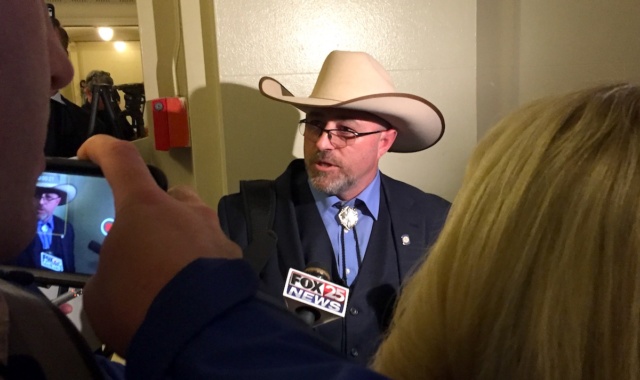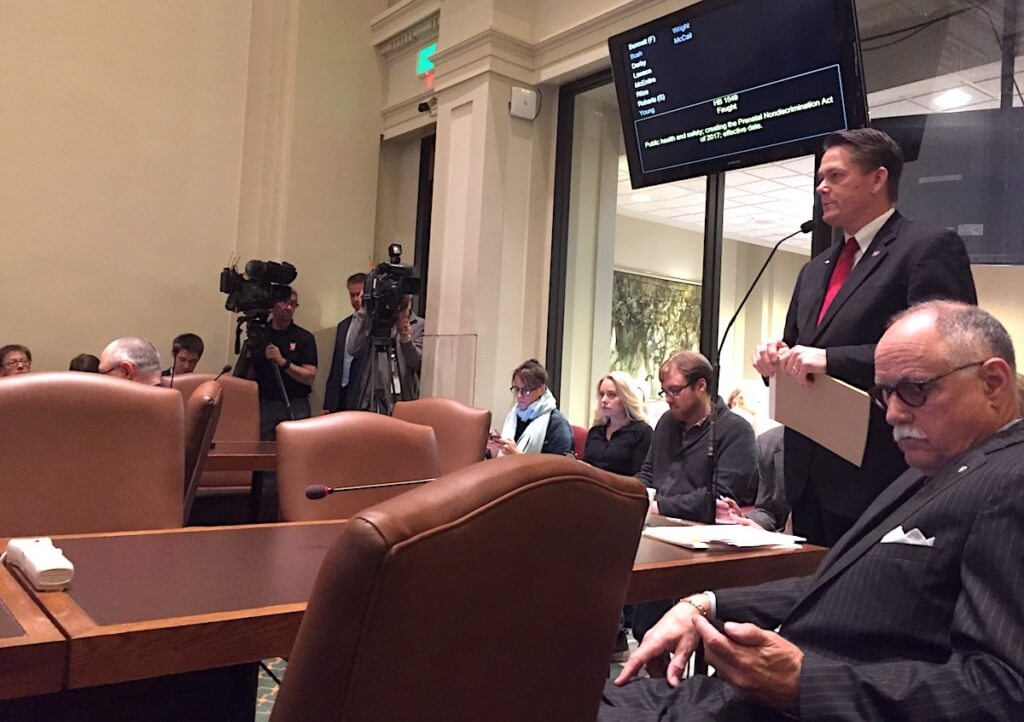
Two controversial abortion bills passed the House Public Health Committee this morning on 5-2 votes along partisan lines.
Both bills featured new language submitted as committee substitutes at Tuesday’s meeting. One had failed to pass out of the committee last week and was re-heard, while the other had drawn palpable online outrage owing to the author’s use of the word “hosts” to describe pregnant mothers.
“When I used the word ‘host,’ I did not mean to degrade women,” Rep. Justin Humphrey (R-Lane) told more than a dozen media members in an impromptu press scrum after his bill passed. “I think I used the proper verbiage. I’m not angry because of all the calls and threats I’ve got.”
Among other reactions, people have berated Humphrey on his Facebook page, going so far as to put the word “HOST” over a picture of his wife.
“Ignorant and stupid won’t get you very far with me,” Humphrey said.
HB 1441, by Humphrey, would prohibit an abortion to be performed “without the written informed consent of the father of the baby.” The bill also would require any woman seeking an abortion to provide, in writing, the name of the father to the physician performing the procedure. It includes exemptions for pregnancies resulting from rape and incest.
In committee, Humphrey was challenged by Rep. George Young (D-OKC) and Rep. Forrest Bennett (D-OKC), the only two committee members who voted against either proposal. In response to their questions, Humphrey attempted to define his legislation as an attempt to encourage more responsibility from fathers.
“This is about making men responsible to pay their part in the birthing process and the entire process, and this is a bill to try to bring fathers back into their role,” Humphrey said.
Bennett asked whether any language in the bill would actually do that. Humphrey did not answer yes or no, but he said he was striking title on the legislation to allow for further changes and discussion about how to move the “conversation” forward.
“That’s why we are striking title,” he said. “If we need to add those, and I would hope that we would add those.”
During his press availability, Humphrey answered multiple questions about his use of the word host in an interview with The Intercept published Monday, which received national press coverage. He offered a complex hypothetical about what might happen if his 49-year-old wife had her egg “harvested” and mixed with his “seed” to create a zygote that could be carried by a “surrogate host.”
“Would my wife have a say-so in that issue? So now the shoe is more or less on the other,” he said. “I actually went and Googled [the term ‘host’] and I went to Webster, and I couldn’t find a better term. So if there’s better verbiage out there, I’d gladly use it. But I couldn’t find it.
“My goal is not to anger women. But when you get angry over a question, maybe you need to check your position.”
 Loading...
Loading...
Prohibiting abortion because of viable genetic abnormalities

HB 1549, by Rep. George Faught (R-Muskogee), would prohibit doctors from performing an abortion on a woman if they know the woman has sought the abortion “solely because the unborn child has been diagnosed with either a viable genetic abnormality or a potential for a viable genetic abnormality.”
Faught said Rep. Mark Lawson (R-Sapulpa) and other members had explained their concerns on the bill following last week’s 4-4 vote on a do-pass motion. He said the new language defined several parts of the bill more clearly.
“Section six makes clear that the woman may not be prosecuted criminally or civilly,” Faught said.
The bills will now head to the full House floor for consideration.
